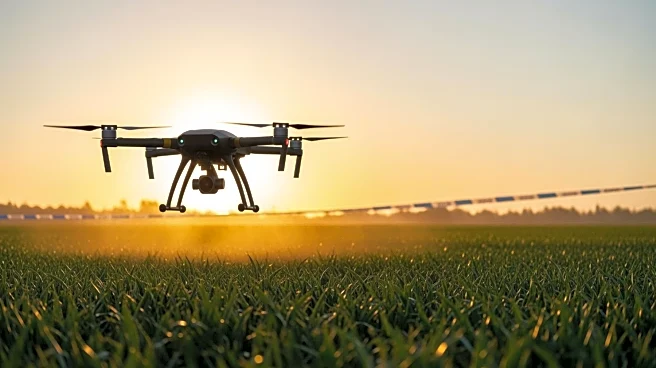What's Happening?
The agri-drones market is anticipated to grow significantly, reaching a valuation of $67.55 billion by 2035, according to a report by ResearchAndMarkets.com. This growth is driven by the increasing demand for climate-resilient agricultural decision support
systems and the integration of drone data into crop insurance and credit systems. Agri-drones are reshaping farming practices by offering precision in spraying, scouting, and seeding, which reduces dependency on heavy machinery, cuts fuel use, soil compaction, and chemical wastage. The market is characterized by rapid adoption of precision agriculture, climate-smart farming, and automation, with drones providing real-time monitoring and adaptive spraying. In North America, the market is expected to grow steadily due to environmental pressures and increased support from private and public sectors. Key players in the U.S. include companies like Hylio, Pegasus Robotics, and PrecisionHawk.
Why It's Important?
The expansion of the agri-drones market is significant for the agricultural industry as it promises to enhance efficiency and sustainability in farming practices. By reducing operational costs and improving input efficiency, agri-drones contribute to the development of digital farming ecosystems. This technological advancement supports the crop protection and fertilizer industries in creating 'drone-ready' formulations, opening new premium product lines. Additionally, the integration of drones with IoT and big data systems facilitates predictive analytics, aiding in informed decision-making. The market's growth also stimulates cross-industry innovation, benefiting sectors like telecom and navigation through increased demand for rural connectivity and reliable positioning systems.
What's Next?
The future of the agri-drones market will likely see further advancements in AI-based analytics, swarm technology, and extended flight endurance. As regulatory frameworks evolve, standardized airspace usage and certification protocols will formalize drone operations. The market is expected to continue attracting government subsidies, regulatory relaxations, and venture capital funding, fostering the entry of niche players. This innovation-driven sector will see intense rivalry as drones transition from niche precision tools to mainstream components of modern agriculture.
Beyond the Headlines
The agri-drones market's growth could lead to ethical and legal considerations regarding data privacy and security in drone operations. As drones become integral to farming, issues related to airspace management and environmental impact may arise. Long-term shifts in agricultural practices could also influence rural economies, potentially altering employment patterns and community structures.















